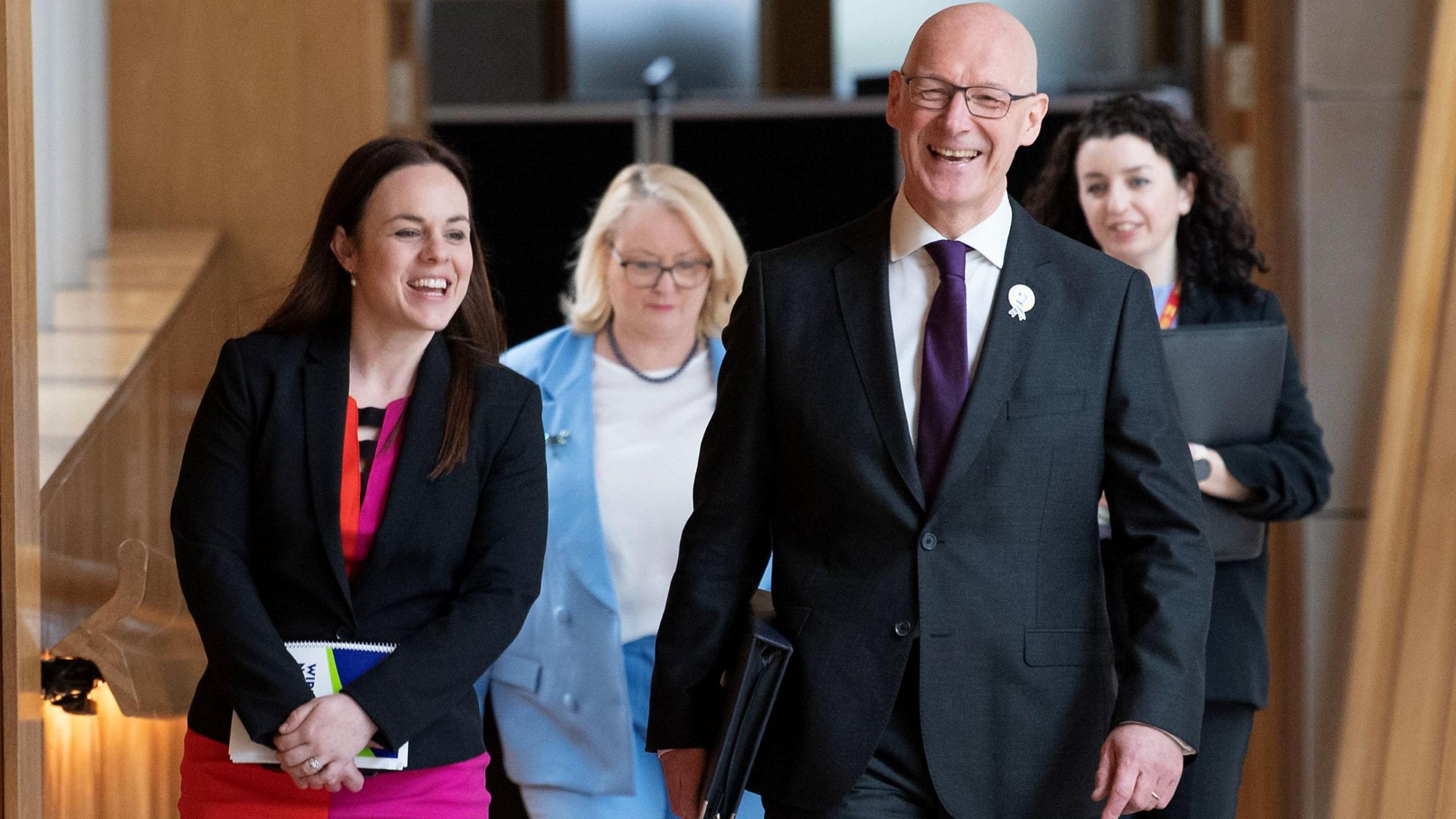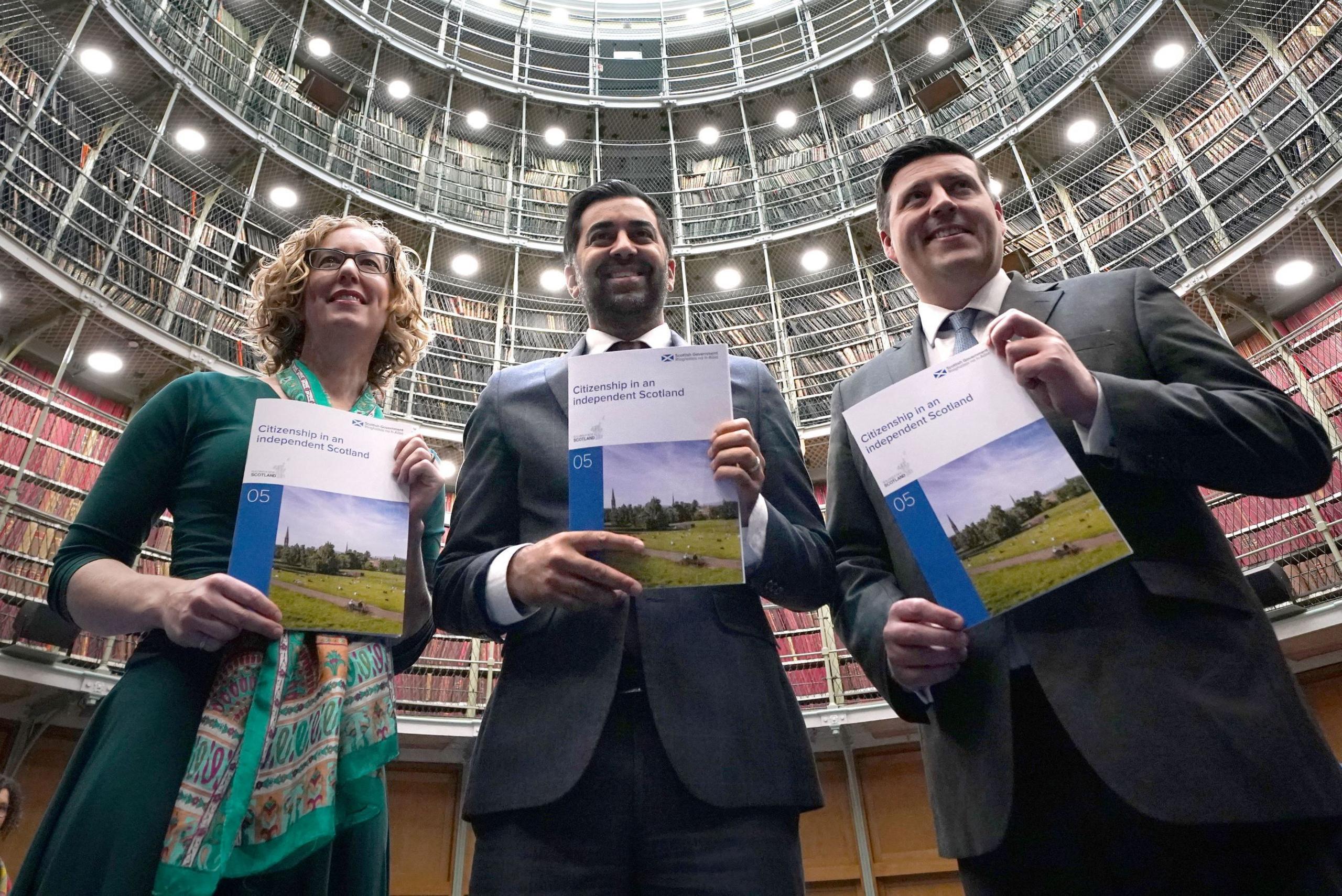Swinney says no change in SNP's referendum strategy

- Published
John Swinney has confirmed that the SNP's strategy for independence is still based on winning a majority of seats at the forthcoming general election.
The new first minister has told BBC Scotland News that winning a majority would be a mandate for another referendum and he would "proceed with urgency" as Scotland could only "move on" if it became independent.
He has also denied that the decision to abolish the minister for independence post in his government has placed the campaign on the backburner.
He said he was going to concentrate on making sure his party built the support for independence by concentrating on issues such as the cost of living and Brexit.
Greens attack Kate Forbes at Swinney's first FMQs
- Published9 May 2024
At-a-glance: The new Scottish cabinet
- Published8 May 2024
John Swinney sworn in as Scotland's first minister
- Published8 May 2024
The news of Mr Swinney's decision to scrap the independence minister post came as the first minister announced his new government on Wednesday.
Jamie Hepburn, who held the post, has taken over as minister for parliamentary business.
Mr Swinney was speaking to the BBC on Thursday, after his first session of First Minister's Questions.
He said he would concentrate his efforts on "winning the arguments and building support" for independence.
He said the cost of living and Brexit are examples where Scotland is being held back by a Westminster government.
But he declined to answer whether failure to secure a majority would mean he lacked public support for another referendum, saying he would not answer hypotheticals.

Independence Minister Jamie Hepburn helped launch the Building a New Scotland papers
Mr Hepburn earlier denied that independence had been downgraded in the government’s list of priorities despite his post being abolished.
He told BBC Scotland News that "every Scottish government minister is a minister for independence and that will remain the case."
He added: “Independence is going to be front and centre of our mission - it always has been - and the work will continue."
However the move has been criticised by some independence campaigners outside the party.
'The wrong signal'
Gordon MacIntyre-Kemp, founder of pro-independence campaign group Believe in Scotland, said the move sent “the wrong signal to a lot of people”.
He called for Mr Swinney to declare himself the minister for independence, and for all ministers to put the case for independence “front and foremost” whenever they announce new policies.
Mr MacIntyre-Kemp said: “If he takes personal responsibility for it he can send the right message on independence. We’re saying step up, double down on independence and send that message out.”
Mr MacIntyre-Kemp said such a move would get grassroots independence supporters “working in harmony" with the SNP.
Graeme McCormick, the former SNP leadership challenger who stood aside for John Swinney, said that it was "right" not to involve the civil service in any way.
He added: "I envisage that this work will be taken forward with greater alacrity."
A central part of Mr Hepburn’s role was overseeing the publication of the government’s Building a New Scotland papers – first launched by Nicola Sturgeon in June 2022 to make the case for independence.
The latest of the papers, on the justice system in an independent Scotland, was published on 25 April, the same day Mr Yousaf’s power-sharing deal with the Scottish government collapsed.
The cabinet secretary for the constitution, Angus Robertson will retain oversight of the issue.
The Scottish government said this would involve publishing further papers in the Building a New Scotland series.
Gender reform
Mr Swinney declined to answer whether he would open up discussions with any future Labour government on the Gender Recognition Reform Bill.
The Conservative government blocked the Scottish Parliament's bill from becoming law in 2023.
The first minister said he would "wait and see" what the political landscape was like.